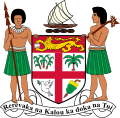
Fiji has experienced many coups recently, in 1987, 2000, and 2006. Fiji has been suspended various times from the Commonwealth of Nations, a grouping of mostly former British colonies. It was readmitted to the Commonwealth in December 2001, following the parliamentary election held to restore democracy in September that year, and has been suspended again because of the 2006 coup, but has been readmitted a second time after the 2014 election. Other Pacific Island governments have generally been sympathetic to Fiji's internal political problems and have declined to take public positions.

The government of the Federated States of Micronesia (FSM) conducts its own foreign relations. Since independence in 1986, the FSM has established diplomatic relations with a number of nations, including most of its Pacific neighbors.

Malaysia is an active member of various international organisations, including the Commonwealth of Nations, the United Nations, the Organisation of Islamic Cooperation, and the Non-Aligned Movement. It has also in recent times been an active proponent of regional co-operation.
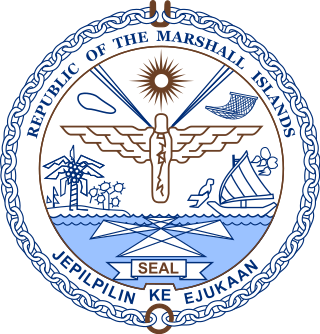
The Republic of the Marshall Islands has established bilateral diplomatic relations with about 105 states. Regional cooperation, through membership in various regional and international organizations, is a key element in its foreign policy.
The foreign relations of Albania are its relations with other governments and peoples. Foreign relations are conducted through the Ministry of Foreign Affairs in Tirana. The current minister is Olta Xhaçka. The current Ambassador to the United Nations is Ferit Hoxha.

Uganda has formal diplomatic relations with many countries, some accredited. Since the colonial era and after independence Uganda has grown to be one of the most important African countries. Uganda has diplomatic relations with many countries throughout Africa, the Americas, Asia, Europe and Oceania. Uganda is a member of the United Nations and the Commonwealth of Nations since 1962.
The foreign relations of Norway are based on the country's membership in NATO and within the workings of the United Nations (UN). Additionally, despite not being a member of the European Union (EU), Norway takes a part in the integration of EU through its membership in the European Economic Area. Norway's foreign ministry includes both the minister of foreign affairs and minister of international development.

Foreign relations of Sri Lanka refers to the diplomatic and commercial relations between Sri Lanka and other countries. Sri Lanka has stressed its principle of "friendship towards all, enmity towards none" in its diplomacy.

The Royal Norwegian Ministry of Foreign Affairs is the foreign ministry of the Kingdom of Norway. It was established on June 7, 1905, the same day the Parliament of Norway (Stortinget) decided to dissolve the personal union with Sweden.

The Ministry of Foreign Affairs, European Union and Cooperation (MAEUEC) is a department of the Government of Spain in charge of planning, managing, carrying out and evaluating the country's foreign and international cooperation for development policies, paying special attention to the ones in relation to the European Union and Ibero-America, as well as coordinating and supervising all actions done in this areas by the other Ministries and Public Administrations. Likewise, it is responsible for promoting international economic, cultural and scientific relationships, taking part in the proposal and application of the migration policy, promoting cross-border and interterritorial cooperation, protecting Spaniards abroad and preparing, negotiating and processing the international treaties which Spain is part of.

The Ministry of Foreign Affairs is the Netherlands' ministry responsible for foreign relations, foreign policy, international development, international trade, diaspora and matters dealing with the European Union, NATO and the Benelux Union. The ministry was created in 1798, as the Department of Foreign Affairs of the Batavian Republic. In 1876, it became the Ministry of Foreign Affairs.

The Ministry of Foreign Affairs is a government ministry of the Republic of Turkey, responsible for the nation's foreign policy and international relations. Established on 2 May 1920, its primary duties are administering diplomatic missions, negotiating international treaties and agreements, and representing the Republic of Turkey at the United Nations. The ministry is headquartered in the Turkish capital of Ankara and counts on more than 200 missions as embassies, permanent representation offices and consulates general, abroad.

The Ministry of Foreign Affairs of Armenia (MFA) is a state body of executive power, which elaborates and implements the foreign policy of the Government of Armenia and organizes and manages diplomatic services. The MFA acts accordingly to the Constitution and legislation of Armenia. The Ministry of Foreign Affairs coordinates the activities of the executive power bodies of the Republic in the international arena. Since 2021, Ararat Mirzoyan has been the Minister of Foreign Affairs of Armenia.

The Ministry of Foreign Affairs of the Republic of Serbia is the ministry in the government of Serbia which is in the charge of maintaining the consular affairs and foreign relations of Serbia. The current minister is Ivica Dačić, in office since 26 October 2022.

The Ministry of Foreign Affairs, abbreviated KLN, is a ministry of the Government of Malaysia that is responsible for foreign affairs, Malaysian diaspora, foreigners in Malaysia, diplomacy, foreign relations, counter terrorism, bilateral affairs, multilateral affairs, ASEAN, international protocol, consular services, maritime affairs, chemical weapons. The current ministry is based in Putrajaya. The Ministry of Foreign Affairs Malaysia is also widely known as Wisma Putra, which is also the name of its building in Putrajaya.
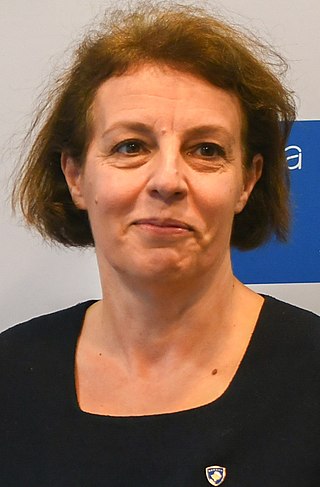
The Ministry of Foreign Affairs is a department of the Government of Kosovo in charge of foreign relations and the admission of Kosovo into the European Union and North Atlantic Treaty Organization (NATO).
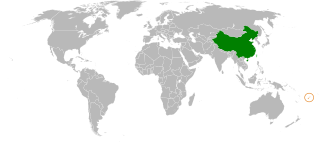
The Republic of the Fiji Islands was the first Pacific Island country to establish diplomatic relations with the People's Republic of China, in 1975. China established an embassy in Fiji in 1976, and Fiji opened its embassy in China in 2001.

The Ministry of Foreign Affairs is responsible for maintaining the Republic of Latvia's external relations and the management of its international diplomatic missions. The actual Minister of Foreign Affairs is Edgars Rinkēvičs, a member of the Unity Party and former State Secretary within Latvia's Ministry of Defence.
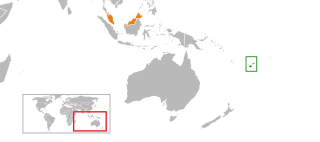
Fiji–Malaysia relations refers to bilateral foreign relations between Fiji and Malaysia. Fiji has a high commission in Kuala Lumpur, which is also accredited to Brunei, the Philippines and Singapore, and Malaysia has a high commission in Suva.

The Chief of Protocol (CoP) is a government official who heads the protocol department of a state, overseeing security, logistics and etiquette in diplomatic and national functions. A protocol department decides on diplomatic immunity and privileges, diplomatic host security, diplomatic use of airspace and it is the guardian of official etiquette. Advance protocol teams, usually headed by the Chief of Protocol, engage as first contact between governments for the planning of bilateral and multilateral summits and visits.
